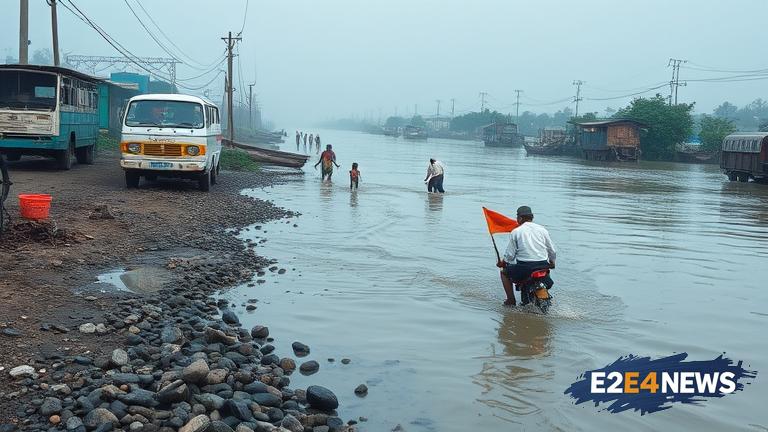Pakistan is experiencing one of its worst flooding crises in recent years, with heavy monsoon rains and the release of water from swollen rivers in India causing widespread devastation in the eastern part of the country. The situation has led to mass evacuations, with thousands of people being relocated to safer areas. The flooding has affected several districts in Punjab and Khyber Pakhtunkhwa provinces, with the cities of Lahore, Faisalabad, and Peshawar being among the worst hit. The Pakistani government has declared a state of emergency in the affected areas and has deployed troops to assist in the rescue and relief efforts. The Indian government has also been criticized for releasing excess water from its dams without warning, which has exacerbated the flooding in Pakistan. The Pakistani authorities have warned of a potential humanitarian crisis, with thousands of people in need of food, shelter, and medical aid. The flooding has also caused significant damage to infrastructure, including roads, bridges, and buildings. The agricultural sector has also been severely affected, with crops and livestock being destroyed. The Pakistani government has appealed for international aid to help deal with the crisis. The United Nations and other international organizations have pledged support to Pakistan, with teams of experts and aid being dispatched to the affected areas. The Pakistani military has also been involved in the rescue efforts, with helicopters and boats being used to evacuate people from flooded areas. The government has also set up relief camps to provide shelter and food to those affected. The flooding has also raised concerns about the potential for waterborne diseases, with the risk of cholera and other illnesses increasing. The Pakistani health authorities have warned of a potential outbreak and have begun to take measures to prevent the spread of disease. The flooding has also disrupted communication and transportation networks, with roads and bridges being damaged or destroyed. The Pakistani government has announced plans to rebuild and restore the damaged infrastructure. The international community has also been urged to provide support to Pakistan to help it deal with the crisis. The Pakistani people have shown resilience and courage in the face of the disaster, with many coming together to help those affected. The government has also announced plans to provide compensation to those who have lost their homes and livelihoods. The flooding has also highlighted the need for better disaster management and preparedness in Pakistan, with the government being criticized for its slow response to the crisis. The Pakistani authorities have promised to take measures to prevent such disasters in the future, including the construction of new dams and the improvement of flood warning systems. The international community has also been called upon to provide support to Pakistan to help it develop its disaster management capabilities. The flooding has also raised concerns about the impact of climate change on Pakistan, with the country being considered one of the most vulnerable to the effects of global warming. The Pakistani government has announced plans to take measures to reduce the country’s carbon footprint and to develop more sustainable and resilient infrastructure.
